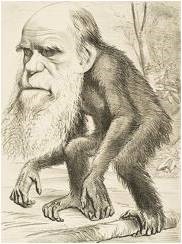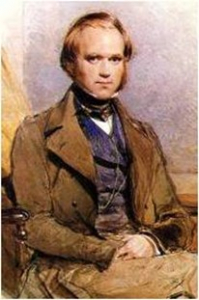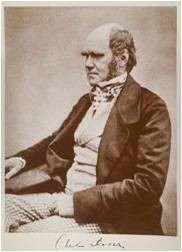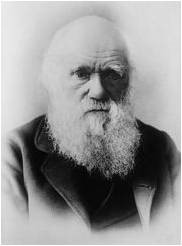
Origin of Life
 Charles Darwin (1809-1882) was a great scientist. He discovered and described the process whereby living organisms adapt to their surroundings and the pressures of life in order to maximise their potential for survival and the preservation of their species. This process is usually called ‘adaptation’, or sometimes ‘microevolution’. The Bible–believer sees in this the hand of the Creator providing a wonderful mechanism which has produced great diversity and beauty within nature.
Charles Darwin (1809-1882) was a great scientist. He discovered and described the process whereby living organisms adapt to their surroundings and the pressures of life in order to maximise their potential for survival and the preservation of their species. This process is usually called ‘adaptation’, or sometimes ‘microevolution’. The Bible–believer sees in this the hand of the Creator providing a wonderful mechanism which has produced great diversity and beauty within nature.
However, Darwin took another step with his theory, one which he admitted himself was not proven by the evidence to hand at that time, but which he believed would be supported by subsequent discoveries. This theory was the subject of his famous book ‘On the Origin of Species’ published in 1859, in which he proposed that a long series of small ‘adaptations’ driven by environmental pressures, mutations and ‘survival of the fittest’ could produce a new species out of an existing species – hence the ‘origin of species’ and sometimes called ‘macroevolution’. Despite the fact that the evidence Darwin confidently expected would be unearthed has not in fact appeared his theory has become the basis for much of modern biological science. There are, however, a significant number of senior scientists who reject Darwin’s theory of evolution; there have also been attempts to develop significant modifications to the theory to accommodate the fossil record.
For the Bible-believer the evolution of species is incompatible with the teaching of the Scriptures. The Bible teaches that God created all living things ‘after their kinds’ (Genesis 1:11, 12, 21, 24). Thus the fundamental divisions of life on earth were established by divine command.
The purpose of this section of the website is to provide information which reflects this belief in Divine Creation as the best explanation of life on earth.
Adaptation and Evolution
It is now necessary to point out that many of those who support the theory of the evolution of species do not make a distinction between ‘adaptation’ and ‘evolution’ (we will use this word to mean ‘the evolution of species’ from now on). This is unfortunate because it allows evidence for ‘adaptation’ to masquerade as evidence for ‘evolution’. For example the case of the peppered moth often figures in books, and even more in television programmes, about ‘evolution’. This small moth comes in various forms, some almost white in colour, others a dark grey. At times of industrial pollution when the surfaces on which they rest are stained dark colours the darker moths predominate because they are better camouflaged; some years later with much less pollution and lighter surfaces the lighter form of the moth predominates. This is a good example of ‘adaptation’ due to environmental pressures and is cited as a ‘proof’ of evolution.
However it should be noted that at the beginning this creature was a peppered moth, as it was throughout the process, and as it remained afterwards. It certainly adapted to its environment by a process of ‘survival of the fittest’, just as Darwin described, but it did not change into another species in the process.
‘Adaptation’ – a wonder of Creation
 ‘Adaptation’ (microevolution) has produced an amazing variety of plants and creatures. The Bible-believer sees in this the wisdom of the Creator who created ‘kinds’ (the word used in Genesis) and gave them the ability to adapt to the pressures of life. Think of the wide range of dogs, from tiny to large, with different temperaments, differing skills, short hair or long – but they are all dogs and can biologically interbreed; there can be physical limitations to their breeding but they are fertile within their ‘kind’ (much of this ‘adaptation’ in dogs has been the result of the intervention of man, but the principle remains valid). By contrast where man has attempted to breed across ‘kinds’ the result is always infertility. The definition of a ‘species’ is uncertain and debated and it seems likely that a Biblical ‘kind’ may contain a number of ‘species’, as is evidenced by ‘hybridisation’ between certain apparently related species, but the barriers between different ‘kinds’ (cats and dogs, for example) appear to be inviolable and reflect the Divine command ‘And God said, Let the earth bring forth the living creature after his kind, cattle, and creeping thing, and beast of the earth after his kind: and it was so.’ (Genesis 1:24)
‘Adaptation’ (microevolution) has produced an amazing variety of plants and creatures. The Bible-believer sees in this the wisdom of the Creator who created ‘kinds’ (the word used in Genesis) and gave them the ability to adapt to the pressures of life. Think of the wide range of dogs, from tiny to large, with different temperaments, differing skills, short hair or long – but they are all dogs and can biologically interbreed; there can be physical limitations to their breeding but they are fertile within their ‘kind’ (much of this ‘adaptation’ in dogs has been the result of the intervention of man, but the principle remains valid). By contrast where man has attempted to breed across ‘kinds’ the result is always infertility. The definition of a ‘species’ is uncertain and debated and it seems likely that a Biblical ‘kind’ may contain a number of ‘species’, as is evidenced by ‘hybridisation’ between certain apparently related species, but the barriers between different ‘kinds’ (cats and dogs, for example) appear to be inviolable and reflect the Divine command ‘And God said, Let the earth bring forth the living creature after his kind, cattle, and creeping thing, and beast of the earth after his kind: and it was so.’ (Genesis 1:24)
‘Evolution’ – did it turn out as Darwin expected?
 Returning to ‘evolution’, Darwin expected that as further discoveries were made of fossils in the rocks the intermediate forms between species would emerge; that the process of change from one species to another would appear as a chain of fossils starting from one species and moving progressively to another. He also expected that this would be a ‘smooth’ process advancing steadily over the vast periods of geological time, culminating in the plants and creatures seen on the earth today. Despite the finding of countless fossils this pattern has not emerged. There has been a very small number of possible intermediate forms (‘missing links’) discovered, such as Archaeopteryx, but they are all controversial and disputed; some have been shown to be elaborate frauds or simply misunderstandings.
Returning to ‘evolution’, Darwin expected that as further discoveries were made of fossils in the rocks the intermediate forms between species would emerge; that the process of change from one species to another would appear as a chain of fossils starting from one species and moving progressively to another. He also expected that this would be a ‘smooth’ process advancing steadily over the vast periods of geological time, culminating in the plants and creatures seen on the earth today. Despite the finding of countless fossils this pattern has not emerged. There has been a very small number of possible intermediate forms (‘missing links’) discovered, such as Archaeopteryx, but they are all controversial and disputed; some have been shown to be elaborate frauds or simply misunderstandings.
The lack of convincing evidence, and indeed that the fossil record appears to tell a different story, has led some scientists to propose alternative explanations. In 1972 Eldredge and Gould proposed a theory of ‘punctuated equilibrium’ suggesting that evolution occurs in sudden, accelerated bursts rather than ‘smoothly’. So the idea that ‘Darwin produced the theory of evolution of species, it has been proved to be true, and all real scientists believe it’ is just not true.
Why is ‘evolution’ so widely taught?
It should be recognised that many scientists believe in evolution and it is widely taught in schools and universities. Given the paucity of the evidence one might wonder why. It may be that the answer is that the only alternative is Special Creation (that is, creation by God) and that is unacceptable to many. There are no other significant theories in science for the explanation of life and its processes so many would see the choice as ‘Evolution’ or ‘Creation’. Believing in Creation carries with it implications for life – if God created the world it would be sensible (even scientific) to listen to what He says about His purpose with it; this may (in fact, will) involve a personal response which some would prefer not to contemplate; hence they choose Evolution.
In the last paragraph it was stated that ‘many scientists believe in evolution’; this is true, but there is a significant number who do not.
The following letter appeared in The Daily Telegraph on 13 February 2009…
“Sir, we are bemused that your distinguished correspondents (Letters, February 9) expressed concern that only 37 per cent of the British population find Darwin’s theory of evolution convincing. They might consider that the problem is that neo-Darwinism has far outrun its basis in scientific evidence. While the evidence for evolutionary adaptation, modification and variation within species – which is what Darwin actually discovered – is secure, the evidence for how complex organisms developed is modest in the extreme. Is it surprising that there is a degree of incredulity that random mutation and natural selection alone can account for the vast complexity of life? A much more open and honest debate is needed. If we lose a spirit of critical inquiry, even about Darwinism, we dishonour the pursuit of science.”
The letter is signed by…
Professor Norman Nevin, Emeritus Professor of Medical Genetics, Belfast
Dr Tim Wells, Senior Lecturer in Neuro-endocrinology, Cardiff University
Professor Stuart Burgess
Professor Steve Fuller, Professor of Sociology, University of Warwick
David Galloway, Consultant Surgeon, Glasgow
Professor Andy McIntosh
Dr Alastair Noble, Former Inspector of Schools
Professor Colin Reeves, Emeritus Professor of Operational Research, Coventry University
Dr Stephen Taylor, Reader in Electrical Engineering and Electronics, University of Liverpool
Dr John Walton, Research Professor of Chemistry, University of St Andrews
Intelligent Design
 ‘Intelligent Design’ is the term given to the argument that the complex designs of the world around us argue for the existence of a Designer, which Bible-believers are convinced is the God of the Bible. A significant aspect of the arguments of intelligent design involves the concept of ‘irreducible complexity’. This recognises that there are many examples where two or more separate developed specialisations are required for the operation they perform together; one of the special developments alone does not provide the function and there is therefore no reason for it to be selected preferentially and so persist, the same is true of the second special development so there appears to be no mechanism within the parameters of evolution to account for the two developments appearing at the same time so that they can work together to provide the function. An example of this is bi-pedalism in humans (walking on two legs). It is known that three distinct developments are needed to achieve bi-pedalism – one in the foot, one in the knee and one in the hip joint (Burgess S, The Origin of Man, Page 22, Day One Publications, 2004). None of these by itself confers the function of bi-pedalism – all three are required for functionality and must be present together.
‘Intelligent Design’ is the term given to the argument that the complex designs of the world around us argue for the existence of a Designer, which Bible-believers are convinced is the God of the Bible. A significant aspect of the arguments of intelligent design involves the concept of ‘irreducible complexity’. This recognises that there are many examples where two or more separate developed specialisations are required for the operation they perform together; one of the special developments alone does not provide the function and there is therefore no reason for it to be selected preferentially and so persist, the same is true of the second special development so there appears to be no mechanism within the parameters of evolution to account for the two developments appearing at the same time so that they can work together to provide the function. An example of this is bi-pedalism in humans (walking on two legs). It is known that three distinct developments are needed to achieve bi-pedalism – one in the foot, one in the knee and one in the hip joint (Burgess S, The Origin of Man, Page 22, Day One Publications, 2004). None of these by itself confers the function of bi-pedalism – all three are required for functionality and must be present together.
As a result of the conditions described in the last paragraph presenters of natural history programmes on television are often heard to say things such as ‘Nature has arranged that…’ and ‘Nature has planned for…’ or ‘Nature has provided ….’ as if Nature has thought about it and recognised what will be needed by a particular animal or plant, and acted accordingly. Within the evolutionary paradigm no such consideration is possible – it is all blind chance.
Conclusion
 It seems, then, that evolution does not stand on the certain ground that its proponents would claim. That so much of the evidence advanced for evolution is based on adaptation within a species, which is actually irrelevant to the debate about the origin of species, indicates the lack of hard evidence for the evolution of species. There is a great deal of evidence for the truth of the Scriptures, some of which will be found on other parts of this website, and the Bible offers a satisfying explanation of the origin of life and of species. This in no way reduces the opportunities for the scientist to explore and understand the wonderful complexities of nature, and those who do so within a personal belief in the Creator find their work enhanced by the realisation that all we see has behind it the hand of a loving God.
It seems, then, that evolution does not stand on the certain ground that its proponents would claim. That so much of the evidence advanced for evolution is based on adaptation within a species, which is actually irrelevant to the debate about the origin of species, indicates the lack of hard evidence for the evolution of species. There is a great deal of evidence for the truth of the Scriptures, some of which will be found on other parts of this website, and the Bible offers a satisfying explanation of the origin of life and of species. This in no way reduces the opportunities for the scientist to explore and understand the wonderful complexities of nature, and those who do so within a personal belief in the Creator find their work enhanced by the realisation that all we see has behind it the hand of a loving God.
Here are two quotations from the Scriptures, one from the Old Testament and one from the New: ‘In the beginning, God created the heavens and the earth.
The earth was without form and void, and darkness was over the face of the deep. And the Spirit of God was hovering over the face of the waters.
And God said, “Let there be light,” and there was light. (Genesis 1:1-3 ESV)
By faith we understand that the universe was created by the word of God, so that what is seen was not made out of things that are visible. (Hebrews 11:3 ESV)
![]()
